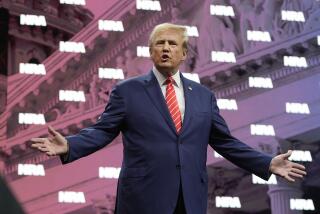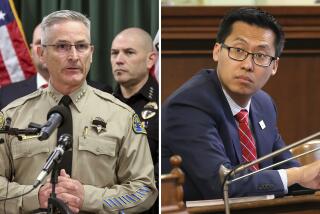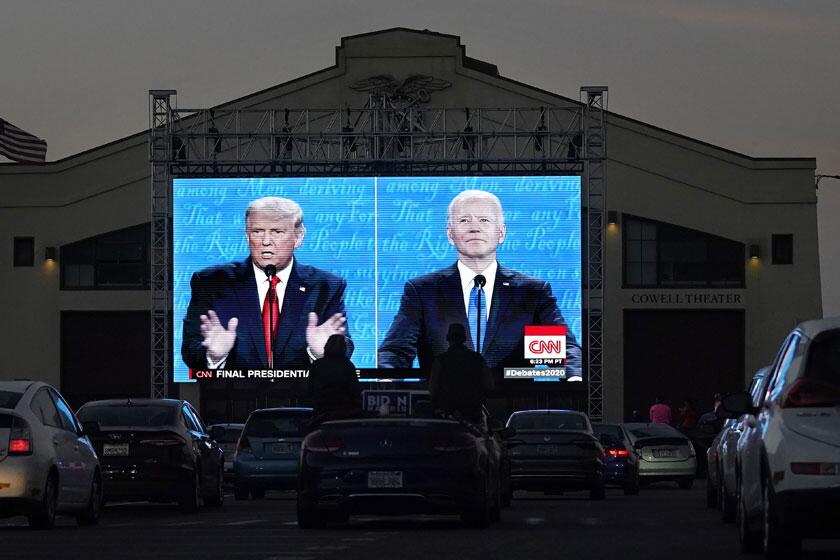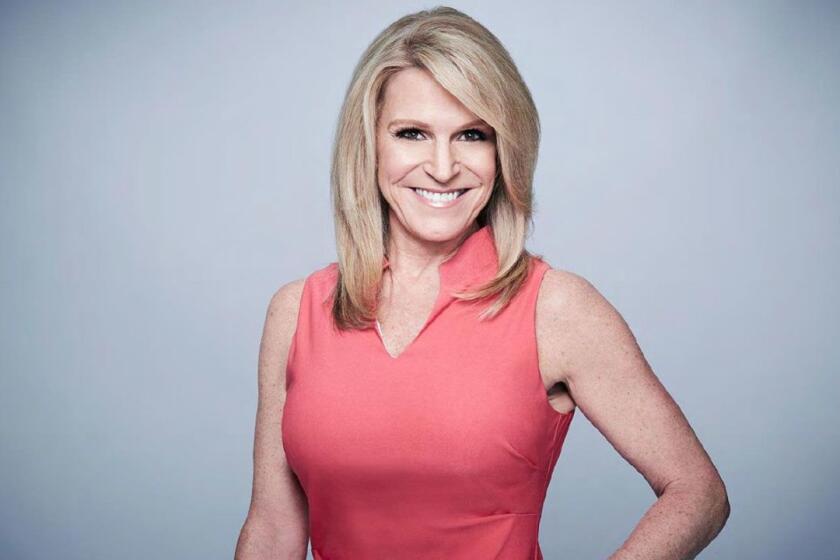Are You Ready for Campaign ‘96? C-SPAN Is : Television: President Clinton’s low ratings are luring candidates who want to capture the White House, says the cable network, which has begun campaign coverage with a monthly show.
Although President Clinton has been in office for only five months and the Iowa caucuses and New Hampshire primary won’t be held until February, 1996, C-SPAN has already begun its coverage of the next presidential campaign.
Cable television’s commercial-free public-affairs network launched “Road to the White House ‘96” last month. Airing the first Sunday of each month, the second 90-minute edition arrives Sunday at 6:30 p.m. (with a repeat at 9:30 p.m.).
“If someone had told me in January that I would be back in New Hampshire in March or April, I would have told them that they’re crazy,” said Steven Scully, the show’s producer.
C-SPAN is “not trying to do anything to speed up” the presidential campaign process, long derided by many experts and voters as already being too long, Scully said. Instead, the show is a result of the unprecedented number of prospective candidates--encouraged by Clinton’s record low approval ratings for a President this early in a term--who have already trekked to New Hampshire, Iowa and elsewhere to make initial efforts to find supporters.
“If they weren’t in California, Iowa and New Hampshire laying the groundwork for a possible campaign, we certainly wouldn’t have this program on the air at this stage of the game,” Scully said. “The timetable was set by the candidates and we just responded to that.”
A spokeswoman for the Democratic National Committee, while taking a shot at the trend of possible Republican candidates beginning exploratory campaign efforts so early (“Some of these folks are spending a lot of time looking for their next job as opposed to doing the job they’ve got now”) was full of praise for C-SPAN.
“I have to say C-SPAN did an incredible job in the 1992 campaign,” said Catherine Moore, the communications director for the Democratic National Committee. “Its programming has been beneficial to lots of people around the country to help make people more aware, so I certainly support efforts to make more information available to voters.”
Segments on Sunday’s show include a meeting between Ross Perot and his New Hampshire volunteers--a session that Scully said was closed to all media except C-SPAN--and former Secretary of Labor Lynn M. Martin addressing a Republican group in that state.
“A year or two before the 1988 and 1992 elections, before the candidates became household names, they were going to the coffees, attending receptions and meeting people,” Scully said. “That’s the grass-roots politics at its best and what we’re trying to show here. We’re not out to show another speech by Bob Dole or just another speech by any other potential Republican candidate.”
To keep “Road to the White House ‘96” simply from being a forum for Clinton-bashing, C-SPAN is showing political appearances by Clinton and will include speeches by surrogates such as Democratic National Committee Chairman David C. Wilhelm.
Sunday’s program will have coverage of Clinton attending a June 19 Maine fund-raiser on behalf of Senate Majority Leader George J. Mitchell (D-Me.) and speaking to a group of New Hampshire high school students.
“(We’re) not only showing what the Republicans are doing, but that the fact that Bill Clinton is doing some very overt campaign events,” Scully said. “We felt it would be appropriate to show what he’s trying to do to continue what has been an almost nonstop campaign. Every time he’s out, he’s shaking hands and talking to people, and we’re trying to show that.”
Prospective third-party candidates will also be included on the show when they start their efforts, Scully said.
“Road to the White House ‘96,” is done in C-SPAN’s “video-verite” format, attaching a wireless microphone to the candidate, then unobtrusively following him or her throughout an event. The tape is then shown almost totally unedited, without commentary.
“We can show these folks as real people--as real as it can be for a possible candidate who’s wearing a wireless mike and talking to people,” Scully said. “They almost forget that we are there because it’s not a media event. It’s them trying to be natural to individuals who may support them if they decide to run for the presidency.”
On its first show, “Road to the White House ‘96” taped Rep. Robert K. Dornan (R-Garden Grove) at a gathering of New Hampshire conservatives.
“The only nervous thing was when they put a hot mike on my belt when I went into this big crowd of conservatives to make the rounds,” the former KTLA and KHJ television talk-show host said. “I said, ‘Wait a minute, I don’t think I want to do this.’ They said, ‘Please, please, we just want to get you meeting and greeting.’
“I said, ‘Yeah, but somebody is liable to tell me they’ve got hard evidence that Clinton runs a bordello in Istanbul and I don’t want them calling him a blankety-blank.’ So I said, ‘I’ll leave it on if you don’t mind me saying as I go around, even before people open their mouths, “Careful, I’m wired for sound.” They said OK, and everybody was gracious and, although tough on Clinton, did not use any scatological terms or vulgar language. I didn’t mind being wired.”
Besides Dornan, the first show also featured appearances by Senate Minority Leader Robert J. Dole (R-Kan.); former Secretary of Defense Dick Cheney; Sen. Phil Gramm (R-Tex.) and Sen. Richard Lugar (R-Ind.); former Education Secretary Lamar Alexander and former Atty. Gen. Dick Thornburgh, along with highlights of Clinton’s commencement address. Scully plans to bring his crew to California later this month when Jack Kemp, the former Housing and Urban Development Secretary, makes stops in this state. William Bennett, the former Secretary of Education whose Iowa appearance was scheduled to be on Sunday’s show but moved elsewhere on C-SPAN’s schedule this weekend because of time constraints, is also scheduled to be on next month’s program.
Reaction from candidates to the program has been lukewarm. Bennett and representatives for Cheney, Dornan, Martin and Perot were all quick to emphasize that none were candidates or had decided yet to seek the presidency in 1996.
Bennett questioned the program’s title.
“I don’t know that they should call it ‘Road to the White House’ because some of us did not know we were on that road until so identified,” Bennett said.
“There’s a great essay in theology about the difference between believers and nonbelievers,” he continued. “Nonbelievers think they are walking from one destination to another, while believers find out all the time they’ve been on the road to perdition or salvation. This is a little bit what the road to the White House is.
“I was invited by the Iowa Republican Party to help raise some money, and I did. I didn’t know I was on the road to the White House, but they said I am, so it must be true.
“It’s fine,” Bennett said. “Why not? You can look at people, find out what they are up to, as long as it’s not taken as literal truth.”
More to Read
Get the L.A. Times Politics newsletter
Deeply reported insights into legislation, politics and policy from Sacramento, Washington and beyond. In your inbox three times per week.
You may occasionally receive promotional content from the Los Angeles Times.






